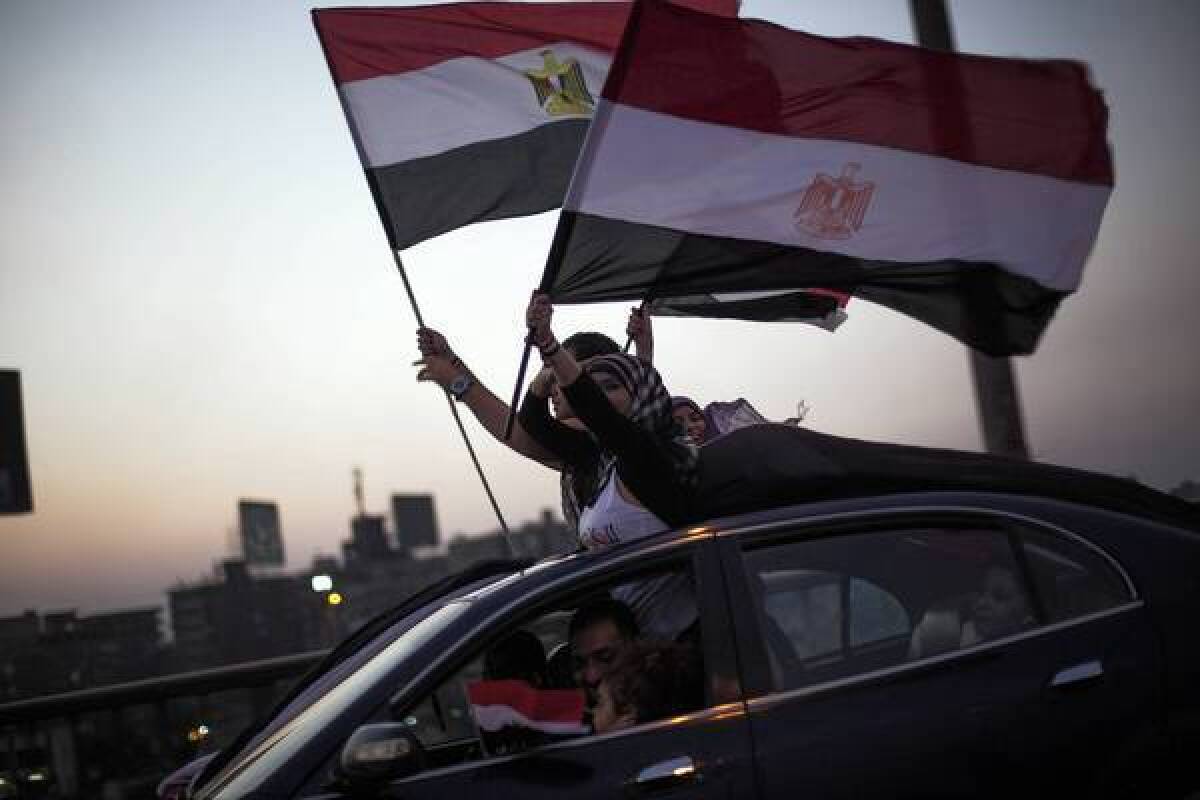Young activists again feeling squeezed out of Egypt’s rebellion

- Share via
CAIRO — The young activists behind the protests that led to last week’s military overthrow of President Mohamed Morsi fear they once again may be overshadowed by other political forces as Egypt stitches together a coalition government ahead of new elections.
The scenario in Egypt’s tumultuous politics mirrors the toppling of autocrat Hosni Mubarak more than two years ago: The youth ignite a rebellion, the army seizes power, a transition government is formed, elections are held and activists end up marginalized.
The difference this time is that the Muslim Brotherhood, a year ago the nation’s preeminent political force, has been leveled by a coup and replaced by civilian leaders approved by the military. Activists supported this week’s appointments of liberal economist Hazem Beblawi as prime minister and secular opposition leader Mohamed ElBaradei as vice president of foreign affairs.
But they are suspicious of the generals who have praised the newest youth movement, Rebel, while moving quickly to solidify the army’s authority. Activists backed the coup against Morsi as a lesser evil than the Brotherhood’s authoritarianism and Islamist designs on the state. They may now find — as they did in 2011 — that the youth’s street power can’t easily be turned into political capital.
The youth could be outmaneuvered “because they are not representing and expressing themselves but allowing others to,” said Hazem Hosny, a political science professor at Cairo University. “They should have stayed on the scene and kept their voices heard. ElBaradei did nothing in recent days to express the revolution and its goals and what the youth want.”
Questions over the future of the youth movement came as prosecutors Wednesday intensified a crackdown on the Brotherhood, calling for the arrest of the group’s leader Mohamed Badie and other top figures. State media reported that Badie is accused of inciting violence that led to the deadly clashes Monday between the army and pro-Morsi demonstrators.
Authorities said the clampdown is necessary to prevent Islamists from instigating widespread violence. The Brotherhood said the purge is an attempt to push it out of politics, reminiscent of the arrests and persecutions carried out under Mubarak’s police state.
Youth helped bring down the Brotherhood, but are now angling for relevance in a new era.
Interim President Judge Adly Mahmoud Mansour met Tuesday with representatives from Rebel, April 6 and other youth movements. They worry that the military’s “road map” to a new government grants Mansour wide powers and that constitutional amendments will be rushed through without input from all factions — the same scenario that arose after Mubarak’s fall.
Liberals and youth groups oppose wording in the constitution that makes Islamic law the guiding principle of the charter. They pressed for its removal but, as an apparent concession to Islamists, including the influential Nour Party, the interim government did not alter the language.
“I can’t say the youth have been marginalized yet. It will become clearer in the next few weeks and months,” said Shady Ghazali Harb, a youth leader. “The youth know they must now be involved deeply in political work. They have gotten rid of the true danger — the Muslim Brotherhood — and now they must be a part of what happens next.”
Much of the problem is a largely secular opposition that includes socialists, nationalists and Western-leaning democrats. It has thus far failed to articulate a vision for the country and has disappointed young leaders looking for inspiration.
“There’s a bit of a political game being played, and we will continue to push as much as we can until our demands are fulfilled,” said Ahmad Abdou, a member of Rebel. “We are with the people and we are not looking for power or any positions. We’re just a pressure tool ... but to put it bluntly, it’s time for the state of the elderly to go.”
He added, “We will not allow the old regime to return no matter what and we are learning from our past mistakes.”
More than two years ago, April 6 members were invited to meetings with the military and then-interim government. The group’s leaders complained that their concerns were rejected and that, ultimately, they were sidelined by the military, the Brotherhood and older opposition organizations.
“It’s the same image as before,” said Hosny. “They [the army] are trying to drag us into the same scenario in the same style. But this time maybe a lot more people are aware of that and will try to fight against it.”
Egyptians between the ages of 18 and 29 make up about 25% of the population and are increasingly frustrated by a 24% unemployment rate, ailing universities and few chances at prosperity. Some have joined anarchist groups and many are seeking work abroad.
Harb said the young, pushed to the fringes of political life for decades, deserve a chance. “We are calling on all ministers and governors to employ young aides,” he said. “We need to start at the bottom of the employment ladder within state institutions in order to gain experience.”
Hassieb is a special correspondent.
More to Read
Sign up for Essential California
The most important California stories and recommendations in your inbox every morning.
You may occasionally receive promotional content from the Los Angeles Times.











